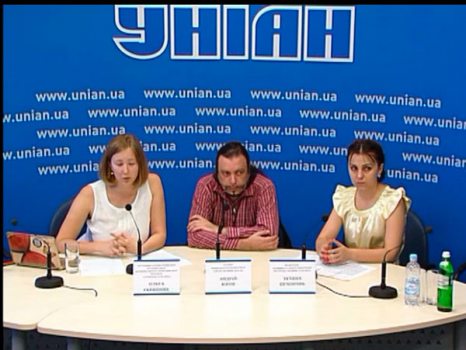Situation in Crimea can be changed only by strong civil society
Chairman of the Crimean Field Mission on Human Rights Andrey Yurov believes that is necessary to strengthen civil society organizations in the Crimea, as civil liberties will be curtailed within a year to the extent it has been done in Russia for 15 years.
This was discussed during a press conference of representatives of the Crimean Field Mission on Human Rights on August 4 in Kyiv.
Crimean Field Mission on Human Rights, which has worked on the peninsula since early March, captures numerous human rights violations. Among them are not only violations of the rights of individuals, but also of entire groups – ethnic, religious, linguistic.
Among such violations there are several serious restrictions on freedom of peaceful assembly. In particular, the prohibition of the rally in memory of victims of deportation on May 18 and dispersal of the rally against corruption in Sevastopol in April.
The cases of torture and murders of the Crimean Tatar Rashat Ametov, major of the Ukrainian Navy Stanislav Korachevsky and 16-year-old native of Rivne Mark Ivanyuk, committed between March and April, still haven't been properly investigated.
Information provided by the prosecutor's office raises serious concerns about the effectiveness of the investigation into the abductions that took place in late May. Namely, May 22 disappeared a member of the initiative group "Ukrainian People's House" Leonid Korzh; May 26 – Timur Shaymardanov; May 30 Seyyran Zinedin was kidnapped. All three missing were activists working for the integrity of Ukraine and assisted the Ukrainian military in the Crimea during their blockade (in February-March 2014).
Crimean field mission also documented a number of cases of harassment of journalists. This includes illegal seizure of vehicles, beatings and illegal detentions of journalists in the performance of their duties.
In addition, the mission draws attention to the systematic violations of the rights of drug users and prisoners. In particular, they are talking about the abolition of methadone and the inability to be released in accordance with the Ukrainian law on amnesty.
"A number of human rights violations in the Crimea is also associated with the actions of the local self-defense. There were documented numerous cases of illegal detention and the use of physical force by this illegal paramilitaries. In this case, the Crimean authorities are trying to even legalize these illegal groups," said Andrey Yurov.
The problem of migration and passports and the problem of citizenship remains essential for many people in the Crimea.
According to the head of the CFM, the people who didn't manage to timely renounce Russian citizenship, got in quite a difficult situation: "There is a big problem with the people who wanted to renounce from it, but didn't manage to do it in the past months. The matter is that that “granting” of the Russian citizenship is very similar to the situation with serfdom: people with the land were automatically transferred to the citizenship of another country. That is, from the point of view of international law, people who would like to obtain Russian citizenship, need to write a statement, not the people who would like to leave the Ukrainian citizenship,” stated Mr. Yurov.
As reported by Olga Skripnik, deputy chair of the Crimean Field Mission and director of the Center of Civic Education "Almenda", the Ukrainian authorities can not solve all the problems of the Crimean people who remain citizens of Ukraine.
"Law on the rights and freedoms of citizens is not wholly observed on the temporarily occupied territory of Ukraine, no concrete mechanisms for its implementation have been established so far. The Board of Ministers of Ukraine was to have adopted more than a dozen relevant resolutions in the beginning of May, but still hasn't done it. This creates a lot of problems and legal uncertainty for those people in the Crimea, who want to remain citizens of Ukraine," said Olga Skripnik.
The human rights activist noted that Crimean authorities use the laws of the Russian Federation and local resolutions to create difficulties for the Ukrainian citizens and force them to take Russian passports.
According to Andrey Yurov, the human rights situation in the Crimea will change for the better only if there appears a strong civil society. "Nothing will change by itself, the situation will only become gloomier”, he added. “It is therefore important, in spite of growing pressure, to preserve and develop civil institutions in the Crimea."


















